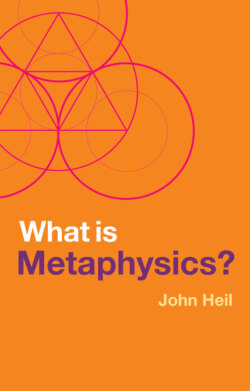Читать книгу What is Metaphysics? - John Heil - Страница 18
2.2 A Fourth Dimension
ОглавлениеThis talk about the passage of time is all well and good, but if the goal is to understand time, why not ask the experts? Physicists, after all, have had a good deal to say about time. Time, they tell us, is a “spacelike” fourth dimension inextricably bound up with space. The universe is a four-dimensional McTaggartesque block. Its occupants can be at temporal distances from one another analogous to spatial distances. Your passing the willow and subsequently passing a granite outcropping are both there, at a temporal, as well as spatial, distance from one another. You, as you read these words, are really a stage or temporal part of a you extended in both space and time.
This should remind you of McTaggart’s unchanging, B series universe, which lacks the resources to accommodate temporal passage. The passage of time would seem to belong only to the appearances, not to reality.
As McTaggart observed, the thought that things change and objects move from place to place would seem to be at odds with a four-dimensional B series picture. When a tomato ripens, changing from green to red, what you really have are adjacent temporal parts or stages of the tomato. The tomato is analogous to a highway that passes through varied terrain. The highway is shady in some places, bumpy and in need of repair in others. These features of the highway are all there at once. Similarly, one temporal part of the tomato is green, another red. What you do not have is a persisting object that at one time is wholly green and, at a later time, wholly red. The tomato’s changing in color is really a matter of its parts – its temporal parts – being differently colored.
In the same vein, despite appearances, when you walk to the store, there is not a single you fully occupying successive regions of space, leaving behind vacated regions. Instead, stages or temporal parts of you occupy adjacent regions of spacetime. Your temporal parts are strictly analogous to your spatial parts. Just as your right half and left half are distinct spatial parts of you, you yesterday, you today, and you tomorrow are portions of a temporally extended you.
Even if you were sanguine about all this – and few are – you might worry about what happens to free will given a four-dimensional universe. We like to think that we control our destinies, at least up to a point: by acting today, you help make tomorrow what it is. But if a later you is merely a part of the same temporally extended entity that includes an earlier you, in what sense could you affect the future, even a little? You could no more bring it about that your future self is one way rather than another than one segment of a broomstick could bring it about that another segment has the character it does.
This idea is so appalling to some philosophers that they regard it as a reason to rewrite physics. If that strikes you as special pleading, ask yourself how it could be rational for you to plan, as you assuredly do, for a future that is no more subject to your influence than the past is.
